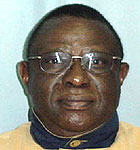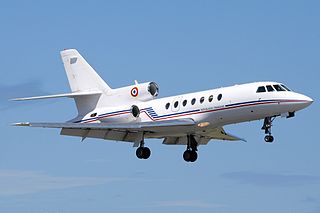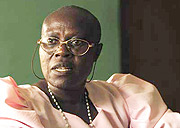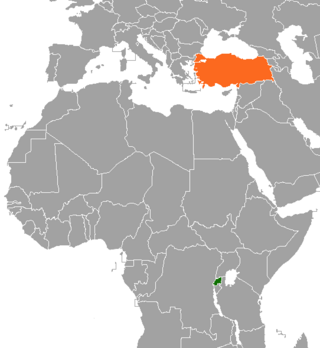Related Research Articles

The United Nations Assistance Mission for Rwanda (UNAMIR) was established by United Nations Security Council Resolution 872 on 5 October 1993. It was intended to assist in the implementation of the Arusha Accords, signed on 4 August 1993, which was meant to end the Rwandan Civil War. The mission lasted from October 1993 to March 1996. Its activities were meant to aid the peace process between the Hutu-dominated Rwandese government and the Tutsi-dominated rebel Rwandan Patriotic Front (RPF). The UNAMIR has received much attention for its role in failing, due to the limitations of its rules of engagement, to prevent the Rwandan genocide and outbreak of fighting. Its mandate extended past the RPF overthrow of the government and into the Great Lakes refugee crisis. The mission is thus regarded as a major failure.

The Rwandan Patriotic Front is the ruling political party in Rwanda.

The Interahamwe is a Hutu paramilitary organization active in the Democratic Republic of the Congo and Uganda. The Interahamwe was formed around 1990 as the youth wing of the National Republican Movement for Democracy and Development, the then-ruling party of Rwanda, and enjoyed the backing of the Hutu Power government. The Interahamwe, led by Robert Kajuga, were the main perpetrators of the Rwandan genocide, during which an estimated 500,000 to 1,000,000 Tutsi, Twa, and moderate Hutus were killed from April to July 1994, and the term "Interahamwe" was widened to mean any civilian militias or bands killing Tutsi.

The Rwandan genocide, also known as the genocide against the Tutsi, occurred from 7 April to 19 July 1994 during the Rwandan Civil War. Over a span of around 100 days, members of the Tutsi ethnic group, as well as some moderate Hutu and Twa, were systematically killed by Hutu militias. While the Rwandan Constitution states that over 1 million people were killed, most scholarly estimates suggest between 500,000 and 662,000 Tutsi died. The genocide was marked by extreme violence, with victims often murdered by neighbors, and widespread sexual violence, with between 250,000 and 500,000 women raped.

Théoneste Bagosora was a Rwandan military officer. He was chiefly known for his key role in the 1994 Rwandan genocide for which he was sentenced to life imprisonment by the International Criminal Tribunal for Rwanda (ICTR). In 2011, the sentence was reduced to 35 years' imprisonment on appeal. He was due to be imprisoned until he was 89. According to René Lemarchand, Bagosora was "the chief organizer of the killings". On 25 September 2021, he died in a prison hospital in Mali, where he was being treated for heart issues.

The assassination of presidents Juvénal Habyarimana and Cyprien Ntaryamira in the evening of April 6, 1994 was the proximate trigger for the Rwandan genocide, which resulted in the murder of approximately 800,000 Tutsi and a smaller number of moderate Hutu. The first few days following the assassinations included a number of key events that shaped the subsequent course of the genocide. These included: the seizing of power by an interim government directed by the hard-line Akazu clique; the liquidation of opposition Hutu politicians; the implementation of plans to carry out a genocide throughout the country; and the murder of United Nations peacekeepers, contributing to the impulse of the international community to refrain from intervention.

The failure of the international community to effectively respond to the Rwandan genocide of 1994 has been the subject of significant criticism. During a period of around 100 days, between 7 April and 15 July, an estimated 500,000-1,100,000 Rwandans, mostly Tutsi and moderate Hutu, were murdered by Interahamwe militias.

Kangura was a Kinyarwanda and French-language magazine in Rwanda that served to stoke ethnic hatred in the run-up to the Rwandan genocide. The magazine was established in 1990, following the invasion of the rebel Rwandan Patriotic Front (RPF), and continued publishing up to the genocide. Edited by Hassan Ngeze, the magazine was a response to the RPF-sponsored Kanguka, adopting a similar informal style. "Kangura" was a Rwandan word meaning "wake others up", as opposed to "Kanguka", which meant "wake up". The journal was based in Gisenyi.
Linda Melvern is a British investigative journalist. Early in her career, she worked for The Evening Standard and then The Sunday Times (UK), including on the investigative Insight Team. Since leaving the newspaper she has written seven books of non-fiction. She is a former Honorary Professor of the University of Wales, Aberystwyth, in the Department of International Politics.

On the evening of 6 April 1994, the aircraft carrying Rwandan president Juvénal Habyarimana and Burundian president Cyprien Ntaryamira, both Hutu, was shot down with surface-to-air missiles as their jet prepared to land in Kigali, Rwanda; both were killed. The assassination set in motion the Rwandan genocide, one of the bloodiest events of the late 20th century.
The "Hutu Ten Commandments" was a document published in the December 1990 edition of Kangura, an anti-Tutsi, Hutu Power Kinyarwanda-language newspaper in Kigali, Rwanda. The Hutu Ten Commandments are often cited as a prime example of anti-Tutsi propaganda that was promoted by genociders in Rwanda following the 1990 invasion by the Rwandan Patriotic Front and prior to the 1994 Rwandan genocide. The chief editor of Kangura, Hassan Ngeze, was convicted of genocide and crimes against humanity in 2003 by the International Criminal Tribunal for Rwanda and was sentenced to 35 years' imprisonment.

Froduald Karamira was a Rwandan politician who was found guilty of crimes in organising the implementation of the 1994 Rwandan genocide. He was sentenced to death by a Rwandan court and was one of the last 22 individuals executed by Rwanda, in April 1998. He was an ethnic Tutsi.

The Gikondo massacre was the mass murder of about 110 people of Tutsi identity, including children, who sheltered in a Polish Pallottine mission church in Gikondo, Kigali. The massacre took place on April 9, 1994 and was executed by Interahamwe militia under supervision of the Hutu presidential guard. The massacre was the first absolute proof of a genocide discovered by UNAMIR during the Rwandan genocide in 1994.

Colonel Luc Marchal is a retired officer of the armed forces of Belgium. He is known for being the senior officer in the Belgian peacekeeping contingent during the 1994 Rwandan genocide, as well as the United Nations Assistance Mission for Rwanda (UNAMIR) sector commander for the capital Kigali.
Rwandan genocide denial is the pseudohistorical assertion that the Rwandan genocide did not occur, specifically rejection of the scholarly consensus that Rwandan Tutsis were the victims of genocide between 7 April and 19 July 1994. The perpetrators, a small minority of other Hutu, and some fringe Western writers dispute that reality.

Valérie Bemeriki is a Rwandan convicted war criminal and radio entertainer. Bemeriki was one of the main animatrices of Radio Télévision Libre des Mille Collines (RTLM), which played a significant role in promoting the genocide against the Tutsi.

The role of France in the 1994 genocide against the Tutsi has been a source of controversy and debate both within and beyond France and Rwanda. France actively supported the Hutu-led government of Juvénal Habyarimana against the Tutsi-dominated Rwandan Patriotic Front, which since 1990 had been engaged in a conflict intended to restore the rights of Rwandan Tutsis both within Rwanda and exiled in neighboring countries following over four decades of anti-Tutsi violence. France provided arms and military training to Habyarimana's militias, the Interahamwe and Impuzamugambi, which were among the government's primary means of operationalizing the genocide following the assassination of Juvénal Habyarimana and Cyprien Ntaryamira on April 6, 1994.
Déogratias Nsabimana was a general and Chief of Staff of the Rwandan Armed Forces (FAR), under President Habyarimana from April 1992 until he was killed on 6 April 1994. He also served as Minister of Defense.

Rwanda–Turkey relations are the foreign relations between Rwanda and Turkey. Turkey has an embassy in Kigali since December 2014. Rwanda's embassy in Ankara opened in August 2013.

Belgium-Rwanda relations refers to the international and diplomatic relations between Belgium and Rwanda. Belgian relations with Rwanda started under the League of Nations mandate, when the modern day countries of Rwanda and Burundi were governed as Ruanda-Urundi. As the colonial power, Rwanda's relationship with Belgium has been significant throughout the country's history, even after independence.
References
- ↑ Ernhede, Christian (4 September 2019). "25 years after the genocide in Rwanda many questions still remain unanswered". The Brussels Time.
- ↑ "Alumnus and honorary ambassador Johan Swinnen talks about Rwanda's darkest days". KU Leuven.
- ↑ "CHAPITRE DE BRUXELLES: CONFÉRENCE DE JOHAN SWINNEN SUR LE GÉNOCIDE RWANDAIS". Graduate Institute of International and Development Studies.
- ↑ "Diplomacy in times of crisis: The Rwandan genocide, story of a diplomat". Thomas More University of Applied Sciences.
- ↑ Melven, Linda (2004). Conspiracy to Murder: The Rwandan Genocide. New York: Verso. p. 28. ISBN 9781844675425.
- ↑ "VRT MAX". www.vrt.be. Retrieved 2023-05-05.
- ↑ verzamelacocunt, werkt hier niet meer (2016-11-14). "Aangrijpend relaas over genocide: ambassadeur zoekt waarheid". EWmagazine.nl (in Dutch). Retrieved 2023-05-05.
- ↑ "Les souvenirs de Johan Swinnen, ambassadeur de Belgique au Rwanda en 1994". Le Soir (in French). 6 April 2017. Retrieved 2023-05-05.
- ↑ "Oud-ambassadeur: "25 jaar later blijf ik met dezelfde vragen zitten over de genocide in Rwanda"". Het Laatste Nieuws (in Dutch). 2019-04-07. Retrieved 2023-11-05.
- ↑ Swinnen, Johan. "Kortsluiting tussen Brussel en Kigali biedt kansen". De Standaard (in Flemish). Retrieved 2023-05-05.
- ↑ Part 1 - ENTRETIEN AVEC SEM JOHAN SWINNEN ANCIEN AMBASSADEUR DE BELGIQUE AU RWANDA - 1990 -1994., 21 August 2021, retrieved 2023-05-05
- ↑ Melvern, Linda (2000). A People Betrayed: The Role of the West in Rwanda's Genocide. Zed Books. ISBN 9781856498319.
- ↑ Melvern, Linda (2004). Conspiracy to Murder: The Rwandan Genocide. New York: Verso. p. 102. ISBN 9781844675425.
- ↑ "Memcon PM Jean-Luc Dehaene of Belgium" (PDF). National Archives.
- ↑ Gerig, Laure. "Johan Swinnen". IPIS (in French). Retrieved 2023-05-05.
- ↑ "Diplomacy in times of crisis: The Rwandan genocide, story of a diplomat". Thomas More University of Applied Sciences.